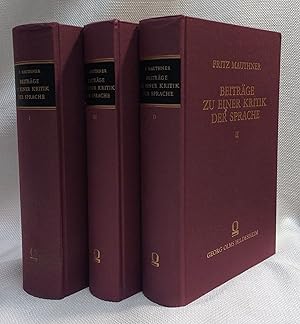Beschreibung
Hildesheim: Georg Olms, 1967 reprints the 3rd edition of 1923. In fine maroon cloth with black labels. A near fine set. No former owner marks. Not available for priority/expedited shipping. Due to the size/weight of this book extra charges may apply for international shipping. A profile of the substance and influences of this work: Largely coinciding with the results achieved by Nietzsche in Ã?Å?ber Wahrheit und LÃ?¼ge im auÃ?Ÿermoralischen Sinne, but nearly three decades later, Mauthner insisted in his BeitrÃ?¤ge on the cooperation of imagination in the formation of language. Thus language sanctions universal meanings, ideas whose validity seems to be due to a cause, to something real. In fact, it lends its protection to a metaphysics given over to which Mauthner attaches the label of ?superstition or word fetishism (Mauthner, 1901-1902). For the fact is that our vocabulary gives an illusion of a supernatural, ideal world.Words and the logic that orders them ultimately sustain a web of fiction a mythology which is managed by a specific interpretation of reality. The key to it is the rudimentary voluntarism and animism with which the human being faces the world in order to make it intelligible. Consequently, his creation is irremediably anthropomorphic hoministic, Mauthner says (Mauthner, 1901-1902). The BeitrÃ?¤ge confirm the social use of language and its levelling action, adducing that it has never gone beyond the convention of herd actions. Therefore, Mauthner concludes, it serves as a collective memory and acts as an instrument of tradition, exercising an impersonal coercion on individual thinking: what thinks in us is language. Words are made not to express the exceptional destiny of each individual but to manage the small needs of all.In view of this analysis, it seems that the measure of linguistic creativity is gregariousness and that, as a result, the expression of authenticity is condemned to the most intimate of monologues. Therefore Mauthner contemplates the possibility of silence, the magnificence of silence as he says, with the support of the teachings of Meister Eckhart. In his WÃ?¶rterbuch der Philosophie he reconstructs the history of the term Mystik, closing with a proposal of sceptical nominalist mysticism, which, in keeping with the enlightenment of language undertaken in the BeitrÃ?¤ge, discards the encounter with the divine (Mauthner, 1910, vol. 2, pp. 362 ff.). Consequently, it is a godless mysticism (gottlose Mystik) as he describes it in Der Atheismus und seine Geschichte im Abendlande which designates the difficult exercise of thinking outside the fetishistic herd metaphysics of words. In the Tractatus Logico-Philosophicus Ludwig Wittgenstein positions his philosophical project against the critique of language developed by Fritz Mauthner. Both authors are interested in indicating the limits of words, and they also agree that silence offers the only possibility of going beyond those limits. The present paper seeks to analyse the two approaches in order to indicate their point of contact and, above all, their different motivations. The fact is that Mauthner denounces the epistemological incompetence of language and its gregarious construction and advises a silent, nominalist scepticism. Wittgenstein reacts to this approach, alleging the logical capacity of language to reflect the facts of the world, although this incapacitates it for expressing value. Thus the Tractatus opens up a mystical path with a religious inclination that contrasts with the confessed atheism of Mauthner's mysticism.". Bestandsnummer des Verkäufers 294089
Verkäufer kontaktieren
Diesen Artikel melden
![]()
